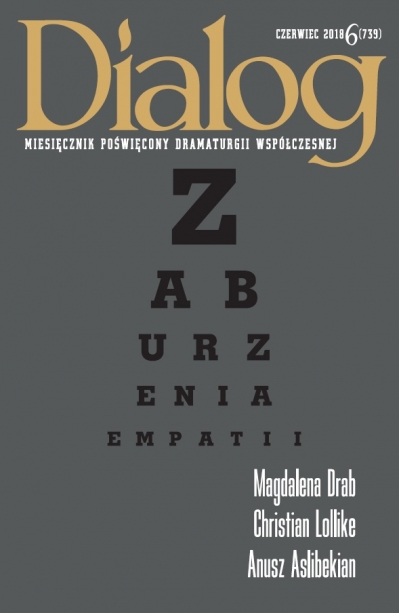Contents
Plays
Magdalena Drab
A Movie Series with People in the Background
The action of the play takes place in a POW camp located in an unidentified country, during some future war of which we know little. A handful of prisoners, kept in a large glass cage, like in a terrarium, is watching a comedy series screened on one of the walls. It is about Captain Lok, a stupid and cruel oppressor. Full of morbid humor parodies of war narratives intertwine with moving scenes from the life (and death) of prisoners. The play refers to the history of the camps, but it can also be understood metaphorically as a disturbing model of culture.
Christian Lollike
Living Dead
An intimate play for three actors tells a story about the migration crisis and the diminishing of empathetic attitudes among the inhabitants of the European Union. In a series of loosely connected scenes the characters share their fears caused by the more and more visible presence - on the streets, and, above all, in the media - of expatriates. They are afraid of the war, they talk about migration routes and refugee disasters. A mantra question of the attitude of representatives of the European Union to the migration crisis returns - as if the characters of the drama tried to shed their moral responsibility on them for not being able to find a solution.
Anush Aslibekyan
Mercedes
Although the play does not refer directly to the Armenian genocide, it returns to the issue of the impact of this catastrophe on the Armenians' today's life. It tells the story of two sisters: Zarui, who, as part of the repatriation campaign of 1948, decides to return to Armenia and her sister Mercedes, who remains in Greece. The family bond is maintained thanks to the exchange of letters, although the sisters have no doubt that due to the censoring of correspondence, everything cannot be written. But it is also obvious that they will hide a lot for personal reasons: the price of life in certain realities will remain in the sphere of their privacy.
Essays, Studies
Dobrochna Ratajczakowa
Wanderings of today’s theatre specialist
The situation of theatre specialists has changed fundamentally, although dramas using traditional forms are still being created and we can still watch traditional performances, and theatre specialist will still appear on their audience. Meanwhile, today it is only a part of his/her tasks. For if we look at the landscape of modern times, we will see that there have appeared different areas of the researcher's possible activities.
Michał Lachman
On the benefits of naivety
The monodrama Curko moja ogłoś to is a series of approximations to a person who exists only in the form of images, relations and archival records. A monologue composed of such voices is primarily a testimony of the work of the archivist and chronicler, into whom Magdalena Drab is changing, as both the author of the text and the actress.
Ewa Hevelke
Ala has gone
The artistic program of the celebration of the 50th anniversary of March 1968 was mainly prepared by women. Directors, screenwriters, actresses. In noble theatre; in searching institutions responsible for inspiring public discussion; on the private-non-governmental scene that communicates with its audience using a pop-cultural language. Those who remember 1968 and those who were born long after that date expressed themselves creatively.
Helplesness
Paweł Dobrosielski, Joanna Krakowska, Iwona Kurz, Piotr Morawski, Kornelia Sobczak, Małgorzata Szpakowska, Joanna Woźnicka talk about commemorative celebrations of the 50th anniverasy of March 1968 in the context of current social situation and media discourse.
Jolanta Antas, Michał Kozień
Power speech
One of the most widespread linguistic techniques in politics is the mechanism of political depreciation of the opponent by labeling him, or triggering specific semantic frames, which causes the recalling in the minds of recipients of some negative stereotypes associated with him/her. Strategies and semantic abuse in the language of the ruling party.
This is called justice.
A conversation with Michał Zadara, theatre director.
To raise awarness.
A conversation with Anna Augustynowicz, artistic director of the Współczesny Theatre in Szczecin.
Two discussions in the Weather Forecast cycle about the situation of Polish theatre in the context of the social situation and the cultural policy of the state.
Krzysztof Środa
Old tree was far away
Notes from a journey through Iran, Armenia and Georgia.
Columns
Marek Beylin, Tadeusz Nyczek, Tadeusz Bradecki
Varia
Notes on plays:
Dmitrij Daniłow Человек из Подольска; Ulrike Syha Drift; Thomas Köck Paradies spielen (abemdland. abgesang)



